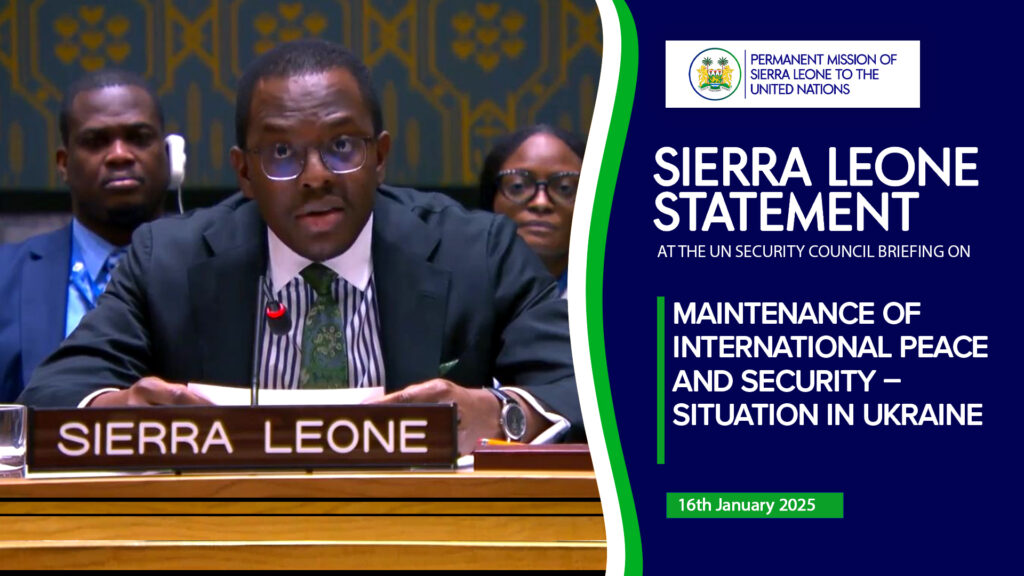STATEMENT BY
H.E. DR. MICHAEL IMRAN KANU
AMBASSADOR AND PERMANENT REPRESENTATIVE
Thank you, Mr. President.
- This briefing, convened at the request of Slovenia and the United States, offers another important opportunity, nearly three years into the conflict, to emphasize the urgent need for peace in Ukraine and the creation of a stable and peaceful region.
- I thank Rosemary DiCarlo, Under-Secretary-General for Political and Peacebuilding Affairs, for her comprehensive briefing.
- As we approach the third year of the Russia-Ukraine conflict, the devastating effects of the war and intensity remain evident. Despite the continuous efforts of the Security Council and the broader international community, a peaceful solution remains elusive, as the conflicting parties persist in prioritizing military objectives.
- Sierra Leone expresses deep concern regarding the intensification of the conflict, particularly the increased use of stand-off weapons, such as long-range missiles, drones, and glide bombs. These weapons, with their extended reach and multiple applications, result in greater casualties and further suffering.
- In the past two weeks alone, both the Russian Federation and Ukraine have launched large-scale airstrikes into each other’s territories. Recently, long-range missiles fired into Russian territory caused significant damage to factories, gas storage facilities, oil depots, and led to school closures and airport restrictions. In retaliation, over 117 missiles and drones were launched at Ukraine’s energy infrastructure, including key gas facilities.
- We also take note of Ukraine’s letter of January 9, 2025, addressed to the Secretary-General, which reported a large-scale Russian aerial attack on Zaporizhzhia on January 8, resulting in at least 13 deaths and 110 injuries. This attack represents the highest number of civilian casualties in the past two years, with further damage to residential buildings, transport facilities, and administrative offices.
- The head of the UN Human Rights Monitoring Mission in Ukraine (HRMMU) recently underscored that “aerial glide bombs have become one of the greatest threats to civilians in cities along the frontlines,” and highlighted that their use contributed to a 30 percent increase in casualties from 2023 to 2024.
- We have condemned the violations of the UN Charter and international law, including international humanitarian law. Given the intensity of the conflict, we are deeply concerned about the indiscriminate use of long-range missiles and drones in densely populated areas, with disregard for the principles of distinction, proportionality, and precaution.
- Concerning the recent attacks on Zaporizhzhia, we reiterate the warning of Director-General Rafael Grossi of the International Atomic Energy Agency (IAEA) about the risk of destabilizing the nuclear power plant in the city. Further attacks could result in a nuclear disaster, with catastrophic consequences for the region and the world. We call on both parties to refrain from launching any attacks on or near nuclear facilities in both Ukraine and Russia.
Mr. President,
- Sierra Leone remains profoundly concerned by the humanitarian crisis caused by the conflict. The suffering of civilians in Ukraine has been immense, with daily loss of life, injuries, and the destruction of homes and properties. The UN has reported over 28,000 civilian casualties and more than 10,000 deaths in Ukraine since the conflict began. Nearly one-third of the population has been displaced, with 6.3 million fleeing to neighboring countries as refugees, and 3.7 million internally displaced.
- The ongoing targeting of Ukraine’s energy infrastructure has led to the destruction of more than 60 percent of the country’s energy generation capacity, resulting in widespread power outages. Millions of people across Ukraine now endure daily electricity shortages, limiting access to essential services such as water, mobile networks, and public transportation, while disrupting children’s education, particularly those attending school remotely.
- Sierra Leone reiterates that attacks against civilians and civilian infrastructure are strictly prohibited under international law. We call on all parties to comply with international law, particularly international humanitarian law.
- As the civilian population faces a harsh winter during the third year of the conflict, with temperatures plummeting as low as minus 20 degrees Celsius, vulnerable groups, especially children, the elderly, and people with disabilities, are disproportionately affected by these disruptions to essential services. While we note Ukraine’s Parliament’s adoption of Law No. 9381 to address the energy crisis, we emphasize that the attacks on energy infrastructure must cease.
- The 2024 Humanitarian Needs and Response Plan for Ukraine aims to assist over 14 million Ukrainians with food, medical services, and other essential humanitarian aid. This plan also targets 1.8 million people in need of winter assistance through March 2025. We echo the appeal of OCHA for additional support to address the funding gap for this vital plan.
- Let me conclude, President, by recalling Sierra Leone’s initial statement in the Council regarding this conflict last January, where we stressed that conflict only breeds destruction, suffering, and loss of life. A year later, this remains the tragic reality: death, destruction, and suffering on an even larger scale.
- We once again urge all parties to commit to political and diplomatic engagement that will lead to the cessation of hostilities and ultimately to the resolution of the conflict. We call for good-faith diplomatic efforts to address the legitimate concerns of all parties involved.
- Finally, I reiterate our call for the full respect of Ukraine’s national sovereignty and territorial integrity within its internationally recognized borders.
I thank you.



